Once again. The tears from the Weeping God were evidently
destined to be swallowed by a Fish:
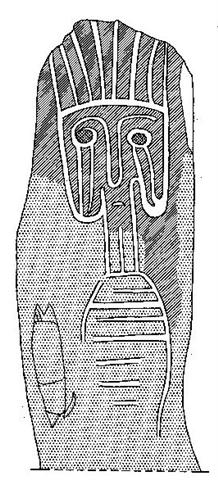
This 'girl' was half dead and needed to be inundated by a stream
of fresh water in order to be able to come
back:
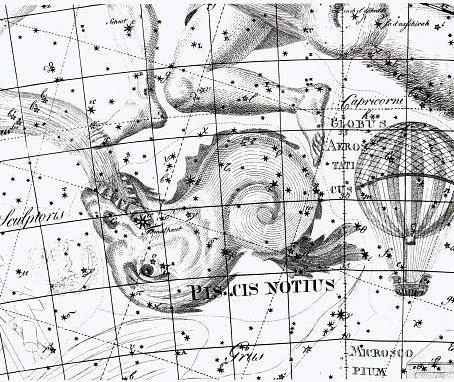
|
 |
164 |
 |
|
Ga4-13 (96) |
Gb2-6 (32) |
|
φ Hydrae → dry |
36 Capricorni → wet |
The Mouth of the Fish was anciently Fom-al-haut, but
later it moved one right ascension day ahead to Fum al Samakah
(*348 = 12 * 29).
|
ST
JOHN'S DAY |
JUNE 25 (181 - 5) |
26
(177) |
27 |
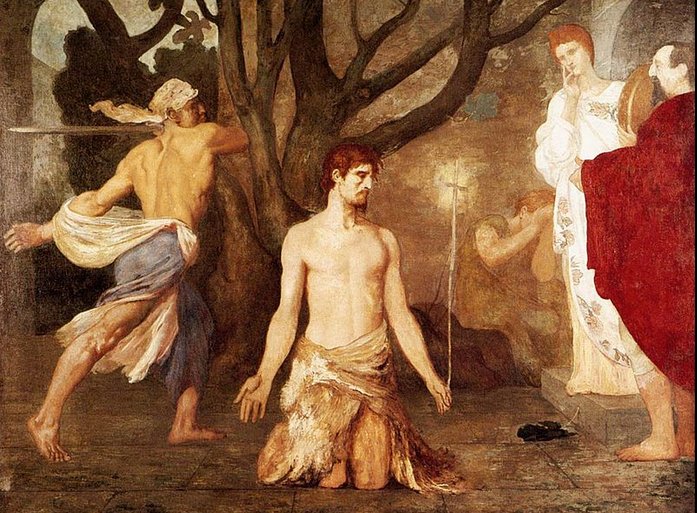 |
 |
 |
 |
 |
|
Ga4-12 (175 = 350 / 2) |
Ga4-13 → 14 * 29½ |
Ga4-14 → Bharani |
Ga4-15 → 4 * 15 = 60 |
|
p Carinae (159.3) |
φ
Hydrae
(160.3) |
no
star listed (161) |
VATHORZ POSTERIOR = θ Carinae
(162.1),
PEREGRINI = μ Velorum,
η
Carinae
(162.6) |
|
... This [η
Carinae] is one of the most noted objects in the
heavens, perhaps even so in almost prehistoric
times, for Babylonian inscriptions seem to refer
to a star noticeable from occasional faintness
in its light, that Jensen thinks was η.
And he claims it as one of the temple stars
associated with Ea, or Ia, of Eridhu¹, the Lord
of Waters, otherwise known as Oannes², the
mysterious human fish and greatest god of the
kingdom.
¹ Eridhu, or Eri-duga, the
Holy City, Nunki, or Nunpe, one of the oldest
cities in the world, even in ancient Babylonia,
was that kingdom's flourishing port on the
Persian Gulf, but, by the encroachment of the
delta, its site is now one hundred miles inland.
In its vicinity the Babylonians located their
sacred Tree of Life.
² Berōssōs described Oannes
as the teacher of early man in all knowledge;
and in mythology he was even the creator of man
and the father of Tammuz and Ishtar, themselves
associated with other stars and sky figures.
Jensen thinks Oannes connected with the stars of
Capricorn; Lockyer finds his counterpart in the
god Chnemu of Southern Egypt; and some have
regarded him as the prototype of Noah ...
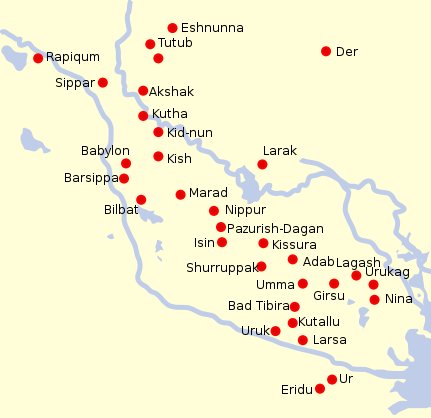 |
|
Aug
27 |
28
(240) |
29
(*161) |
30 |
|
°Aug
23 |
24
(236 = 8 * 29½) |
25 (*157) |
26 |
|
'July 31 |
'Aug
1 |
2
(214) |
3
(*500) |
|
"July 17 |
Te Anakena 18 |
19
(200) |
20
(*121) |
|
... They went on and came to
Tama. They looked around and said, 'This is
Tama.' They gave the name 'Tama, an evil fish (he
ika kino), a very long nose (He
ihu roroa).' Again they went on and came to
One Tea. They saw it, looked around, and gave
the name 'One Tea A Hau Maka'. Then they went on
and came to Hanga Takaure. There they gave the
name 'Hanga Takaure A Hau Maka'. They made camp
and rested at the Bay of Flies for a week (etahi
pohitu). On the eighteenth day of the month
of July ('Anakena'), they went on from Hanga
Takaure. [E:23] |
|
NAKSHATRA DATES: |
|
CHRISTMAS EVE |
DEC 25 |
26
(360) |
27 |
|
η Aquarii (342.1), σ Gruis (342.4),
SITULA
(Water-jar) = κ Aquarii
(342.7)
*301.0 = *342.4 - *41.4 |
ε Piscis Austrini (343.5), ο Pegasi, β Gruis
(343.8) |
ρ Gruis (344.0),
MATAR
(Rain) = η Pegasi
(344.2), η Gruis (344.6), β Oct. (344.7) |
λ Pegasi (345.0), ξ Pegasi (345.1), ε Gruis
(345.3), τ Aquarii (345.7), ξ Oct. (345.8), μ
Pegasi (345.9) |
|
Febr
26 |
27
(58 = 2 * 29) |
28
(424) |
March 1 (*345) |
|
°Febr 22 |
23 |
24
(55) |
25 |
|
'Jan
30 (*315) |
31 |
'Febr 1 (32) |
2 |
|
"Jan
16 (*301) |
17 |
18 (383) |
19 |
|
Egyptian courtyard |
 |
Phoenician heth |
 |
Greek eta |
Η (η) |
|
... The letter shape
ultimately goes back to a hieroglyph
for 'courtyard' ... possibly named
hasir in the Middle Bronze
Age alphabets, while the name goes
rather back to
hayt, the name reconstructed
for a letter derived from a
hieroglyph for 'thread'

... The kaikai are the
rythmic songs that are sung to cat's
cradles, the string games that are
found not only throughout the
Pacific but throughout the world. On
premissionary Rapa Nui the
kaikai, together with their
corresponding cat's cradles, were
not simple children's games but were
used, among other things, to produce
magic effect. They were highly
important for the study of Rapa
Nui's rongorongo. This is
because it was apparently with the
aid of cat's cradles that the
rongorongo experts taught their
pupils to learn many of the chants
accompanying the incised
inscriptions
...
... string games could be resumed
after it was clear that the Sun had
managed to leave the horizon and was
rapidly gaining in altitude: 'Before
the sun starts to leave the horizon
... when it shows only on the
horizon, ... then string games were
no longer allowed as they might
lacerate the sun. Once the sun had
started to go higher and could be
seen in its entirety, string games
could be resumed, if one so wished.
So the restriction on playing string
games was only applicable during the
period between the sun's return and
its rising fully above the horizon
...
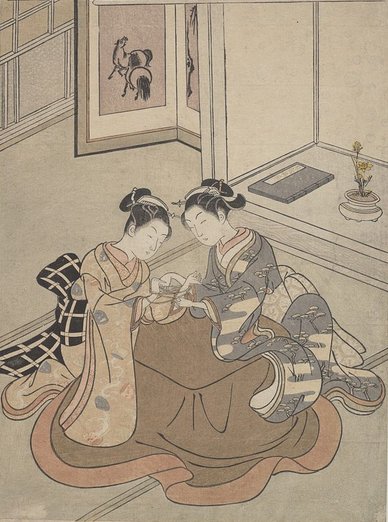 |
|
|
JUNE 28 |
29 (180) |
SIRIUS |
JULY 1
(*102) |
 |
 |
 |
 |
|
Ga4-16 |
Ga4-17
(100) |
Ga4-18 |
Ga4-19 |
|
ν Hydrae (163.1) |
no star listed (164)
ALTAIR (α
Aquilae) |
Wings-27 (Snake)
η
Octans (165.4),
ALKES
(Shallow Basin) =
α
Crateris
(165.6)
*124.0 = *165.4 - *41.4 |
ANA-TIPU-4 (Upper-side-pillar - where the guards
stood)
MERAK
(Loin, not Lion) =
β
Ursae Majoris
(166.2),
DUBHE
(Bear) =
α
Ursae Majoris
(166.7) |
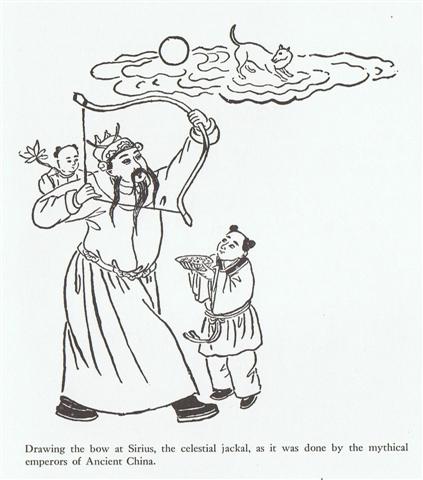
The Chinese Emperor was
drawing his bow at Sirius but he did not use an
arrow ('teka'). His expectant servant in
front of him - probably a female we can see from her
'crocodile' girdle - seems to be waiting for the
resulting rain drops. It was the place in the sky
named after a dry shallow basin (Al Kes). |
|
Aug 31 |
Sept 1 |
2 (*165) |
3 (246) |
|
°Aug
27 |
28 |
29 (*161 → °June
10) |
30 (242) |
|
'Aug 4 (216) |
5 (*137) |
6 |
7 |
|
"July 21 |
22 / 7 → π |
Te Anakena 23
(204) |
24 (*125) |
|
... They remained in Hanga
Hoonu for five days. On the twenty-third day of
the month of July ('Anakena'), they reached Rangi
Meamea ... [E:25-26] |
|
NAKSHATRA DATES: |
|
DEC 28 |
29 |
30 (364) |
31
(*285) |
|
ι Cephei (346.0), λ Aquarii, γ Piscis Austrini, σ
Pegasi (346.5) |
SCHEAT AQUARII
= δ
Aquarii
(347.0),
ρ
Pegasi (347.2),
δ
Piscis Austrini (347.4),
FOMALHAUT
(Mouth of the Fish) =
α
Piscis Austrini,
τ
Gruis (347.8)
*306.0 = *347.4 - *41.4 |
FUM AL SAMAKAH
(Mouth of the Fish) =
β
Piscium
(348.3),
ζ
Gruis (348.5),
ο
Andromedae (348.9) |
Al Fargh al Mukdim-24 (Fore Spout) /
Purva Bhādrapadā-26 (First of the Blessed Feet) /
House-13 (Pig)
SCHEAT PEGASI
=
β
Pegasi,
π
Piscis Austrini (349.3),
κ
Gruis (349.4),
MARKAB PEGASI
=
α
Pegasi
(349.5)
*308.0 = *349.4 - *41.4 |
The 2nd (Rear) Spout came 16 days later, viz. at Sirrah, at 0h (*365.5 -
*349.5 = *16.0):
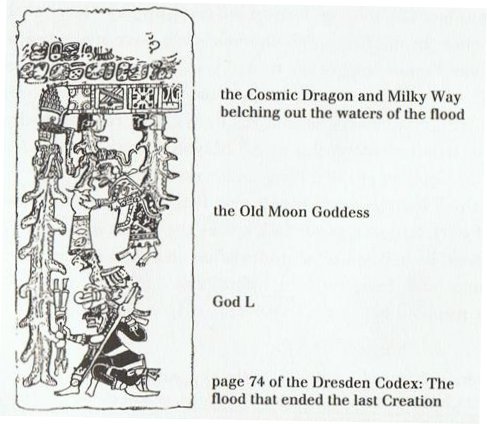
|
CLOSE TO THE SUN: |
|
JULY 15 |
16 |
17 (*118
= 4 * 29½) |
18 (199) |
 |
 |
 |
 |
|
Ga5-6 |
Ga5-7 |
Ga5-8
(118) |
Ga5-9 |
|
no star
listed (180) |
π
Virginis (181.0), θ Crucis (181.5) |
12h (182.6)
ο
Virginis (182.1), η Crucis (182.5) |
ALCHITA
= α Corvi,
MA WEI (Tail of the Horse)
= δ Centauri
(183.1),
MINKAR
= ε Corvi
(183.7), ρ Centauri (183.9) |
|
Sept 17
(260) |
18 (*181) |
19 |
20 |
|
°Sept
13 |
14
(*177) |
15 |
16 |
|
'Aug 21 |
22 |
23 |
24 (236
= 8 * 29½) |
|
"Aug 7 |
8 |
9 |
10 (222
= 6 * 37) |
|
CLOSE TO THE FULL
MOON: |
|
JAN 14 |
15 (380
= 365 + 15) |
16
(*301) |
17 |
|
η
Tucanae (363.0), ψ Pegasi (363.1),
32
Piscium
(363.2),
π Phoenicis (363.4), ε Tucanae (363.6), τ Phoenicis
(363.9)
*322.0 =
*363.4 - *41.4 |
θ Oct.
(364.4)
*323.0 =
*364.4 - *41.4 |
Al Fargh al Thāni-25 (Rear Spout)
0h (365.25)
CAPH (Hand)
= β Cassiopeiae, SIRRAH
(Navel of the Horse)
= α Andromedae
(0.5), ε Phoenicis, γ³ Oct. (0.8) |
Uttara Bhādrapadā-27 (2nd of the Blessed Feet) /
Wall-14 (Porcupine)
ο
Oct. (1.3),
ALGENIB PEGASI
= γ Pegasi
(1.8) |
|
March 19 |
20 (79) |
Gregorian equinox |
22
(*366) |
|
°March
15 |
16
(*360) |
17 |
18 (77) |
|
'Febr 20
(*336) |
21 |
22 (53) |
TERMINALIA |
|
"Febr 6 |
7 (403) |
8 (*324) |
9 (40) |
This was at the last right ascension day of the Chinese House, i.e. at the last of the 65 days of the Dark Warrior.
... In China, with Capricornus, Pisces,
and a part of Sagittarius, it [Aquarius] constituted the early
Serpent, or Turtle, Tien Yuen; and later was known as
Hiuen Ying, the Dark Warrior and Hero, or Darkly Flourishing
One, the Hiuen Wu, or Hiuen Heaou, of the Han
dynasty, which Dupuis gave as Hiven Mao. It was a symbol
of the emperor Tchoun Hin, in whose reign was a great
deluge; but after the Jesuits came in it became Paou Ping,
the Precious Vase. It contained three of the sieu, and headed
the list of zodiac signs as the Rat, which in the far
East was the ideograph for 'water', and still so remains in the
almanacs of Central Asia, Cochin China, and Japan ...
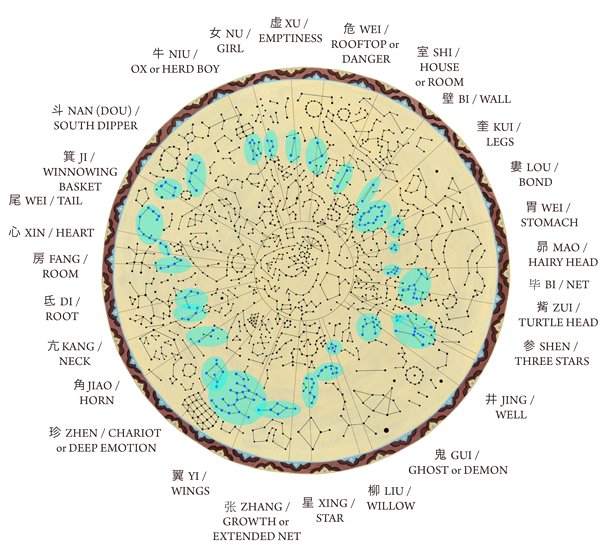
Probably the crying Tuu Maheke
together with the repeated information regarding houses was
meant to make it clear for everyone that this was at (or was
comparable to) the end of the Dark
Warrior (i.e. at 0h and heliacal Sirrah - the Navel of the
Horse).
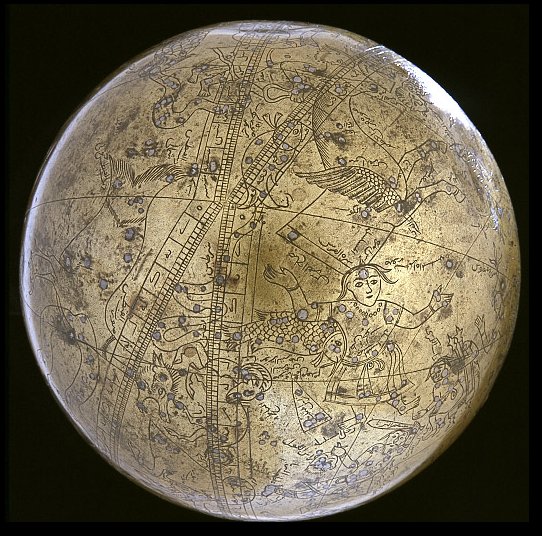
... Taranga had to wipe her eyes
because there were tears in them, and she said: 'You are indeed
my lastborn son. You are the child of my old age. When I had
you, no one knew, and what you have been saying is the truth.
Well, as you were formed out of my topknot you can be Maui
tikitiki a Taranga.' So that became his name, meaning
Maui-formed-in-the-topknot-of-Taranga. And this is
very strange, because women in those days did not have topknots.
The topknot was the most sacred part of a person, and only men
had them ...
|


















